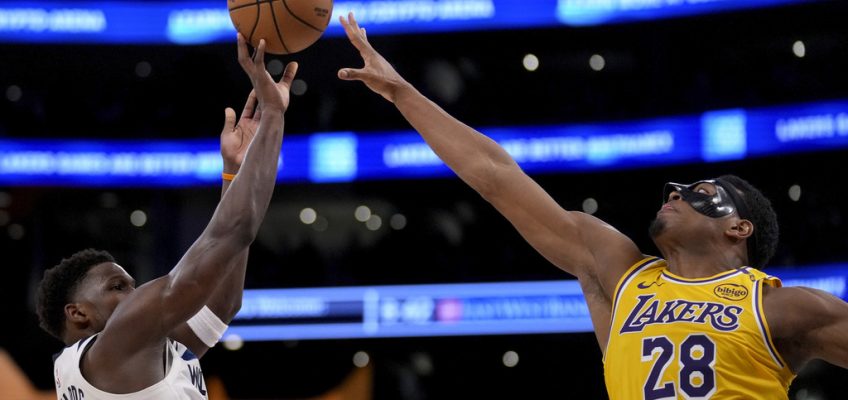Mike Conley is confident Minnesota will open Game 3 on Friday at Target Center with the proper energy. What made the point guard so sure?
“If you’ve ever been in a film session, man, with Finchy after a loss, we’ll be motivated,” Conley said. “We’ll be motivated and ready to go. So, I have no doubt that our guys will be ready.”
Ready to play like which team, though? The one that plays with pace and execution on the offensive end? Or the one that holds that ball and settles for a bunch of contested shots?
The former could win this series. The latter will not.
Jekyll and Hyde have both already made appearances in this series for Minnesota. The results are unsurprising, one win and one loss.
If the Wolves’ star players willingly pass the rock, and everyone else moves without the ball and willingly takes open shots when they arise, Minnesota can effectively handle Los Angeles’ heavy gap-help defense aimed to cut off Anthony Edwards’ driving lanes.
For the approach to work, Minnesota has to be a quick-decision offense. In Game 2, Edwards held the ball for far too long. Afterward, he explained his point of view.
“It seemed like every time I caught the ball, (the defense) kind of went like in a zone, in a sense,” Edwards said. “So, it’s kind of confusing at times.”
After film review, Conley and Wolves coach Chris Finch noted the Lakers gave the same defensive look they have presented all season. The way Edwards played against it Tuesday mirrored the way he approached the challenge during the team’s four regular-season meetings — with little success.
With the week of practice ahead of Game 1, Minnesota was able to get itself prepared to properly expose the Lakers’ defensive scheme with a good offensive process. Yet just three days later, the Wolves fell into many of the bad habits they’ve previously displayed, most notably standing around and holding onto the ball.
“We’ve gotta make decisions that either are quicker or play away from the crowd — all things that we know,” Finch said. “We’ve seen it before all season. We just over-surveyed it and that really made us slow.”
That makes any team easy to guard, s a lesson Minnesota has learned many times in the past. Its offensive performance in Game 1 suggested it had learned, but old habits die hard. Finch was unimpressed with his team’s offensive game plan discipline in the face of a desperate defense.
“I thought we fell back into a lot of poor habits,” Finch said. “Offensive decision making, shot selection, complaining to the refs, all that led to poor transition defense. Ball holding, not playing with the pass early enough, not getting off of it in a crowd.
“Then when we got down, everybody tried to get themselves going. We finished with 14 assists. We had some decent individual performances from time to time, but there was no connectivity to what we were doing offensively.”
Naz Reid didn’t feel as though any of the ball holding was intentional selfishness but added the Wolves have “a lot of guys” who can create for themselves and others, and Minnesota needs to use that to its advantage.
The Wolves spent all of last week drilling their offense against the Lakers defensive scheme. The work paid dividends in Game 1. The discouraging thing for Minnesota was seeing the payoff last all of one game.
“As far as the consistency has come, doing the easy thing can sometimes be the hard thing for us,” Conley said. “We just need to continue to do the easy reads, continue to make the quick decisions and communicating on defense. The stuff that we ask ourselves to do every single night, every single game, those are the things we sometimes slip up on; we try to do too much or try to overthink certain things and make it a little more difficult than it needs to be. I think we can just get back to basics and make those easy reads.”
Finch noted Rudy Gobert is open more often than Minnesota is finding him. The Wolves got Gobert the ball twice in positions to score in the first quarter of Game 2. He didn’t convert, and wasn’t really sought out again.
“Do we pivot and shoot our own shot or find our iso, whatever it is?” Conley asked. “At this moment of the season, you have to continue to just do the right thing, try to make the right read. We’ve got to trust each other, trust big fella, trust us on the perimeter to make shots, because that’s the only way it’s going to make the game easier on the high-usage guys on our team that are going to get a lot of looks and touches.”
If they don’t, then they’re going to hear about it, and not just during a Finch film session.
“We communicate it immediately,” Conley said. “If I need Ant to do something, I tell him right away, like, ‘You said we’re going to do this, we’re going to do it.’ If I’m getting back on defense and guarding a big, I need our bigs to run back and help. We need to all be on the same page. We’re tied to the hip right now. Our communication is at an all-time high. So, we’ve just got to continue to do that.”
Related Articles
Lakers bamboozled Anthony Edwards and Minnesota again. What’s the solution?
Anthony Edwards fined again by NBA, running season total to $370k
Wolves watched as Lakers got stagnant watching Doncic. They knew feeling.
The Timberwolves had one of best shooting performances of the season Saturday. How will the Lakers react in Game 2?
Pack of rabid Timberwolves harass Lakers en route to Game 1 rout


Leave a Reply